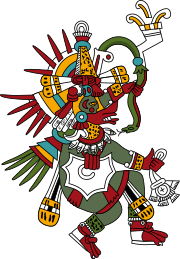Mayahuel

Mayahuel (Nahuatl pronunciation: [maˈjawel]) is the female divinity associated with the maguey plant among cultures of central Mexico in the Postclassic era of pre-Columbian Mesoamerican chronology, and in particular of the Aztec cultures. As the personification of the maguey plant, Mayahuel was also part of a complex of interrelated maternal and fertility goddesses in Aztec mythology and is also connected with notions of fecundity and nourishment.[1]
Description
Products extracted from the maguey plant (Agave spp.) were used extensively across highlands and southeastern Mesoamerica, with the thorns used in ritual bloodletting ceremonies and fibers extracted from the leaves worked into ropes and cloth.[2] Perhaps the most important maguey product is the alcoholic beverage known as pulque,[3] used prominently in many public ceremonies and on other ritual occasions. By extension, Mayahuel is often shown in contexts associated with pulque. Although some secondary sources describe her as a "pulque goddess", she remains most strongly associated with the plant as the source, rather than pulque as the end product.[4]
Mayahuel has many breasts to feed her many children, the Centzon Totochtin (the 400 Rabbits). These are thought to be responsible for causing drunkenness.
Gallery
-
Carving of Mayahuel displayed at the Great Pyramid of Tenochtitlan.
Notes
- ↑ Miller & Taube (1993, p.111); see also n. 87 to folio 265r of Primeros memoriales (Sahagún 1997, p.110).
- ↑ Miller & Taube (1993, p.108)
- ↑ In Nahuatl: octli. Pulque is derived from a fermentation of the sweet liquid sap extracted from the plant (in Spanish: aguamiel, "honey-water"). See Miller & Taube (1993, p.108).
- ↑ Miller & Taube (1993, pp.108,138)
References
- Boone, Elizabeth Hill (2007). Cycles of Time and Meaning in the Mexican Books of Fate. Joe R. and Teresa Lozano Long series in Latin American and Latino art and culture. Austin: University of Texas Press. ISBN 978-0-292-71263-8. OCLC 71632174.
- Carrasco, David (1982). Quetzalcoatl and the Irony of Empire: Myths and Prophecies in the Aztec Tradition. Chicago, IL: University of Chicago Press. ISBN 0-226-09487-1. OCLC 0226094871.
- Miller, Mary; Karl Taube (1993). The Gods and Symbols of Ancient Mexico and the Maya: An Illustrated Dictionary of Mesoamerican Religion. London: Thames & Hudson. ISBN 0-500-05068-6. OCLC 27667317.
- Sahagún, Bernardino de (1997) [ca.1558–61]. Primeros Memoriales. Civilization of the American Indian series, vol. 200, part 2. Thelma D. Sullivan (English trans. and paleography of Nahuatl text), with H.B. Nicholson, Arthur J.O. Anderson, Charles E. Dibble, Eloise Quiñones Keber, and Wayne Ruwet (completion, revisions, and ed.). Norman: University of Oklahoma Press. ISBN 978-0-8061-2909-9. OCLC 35848992.
